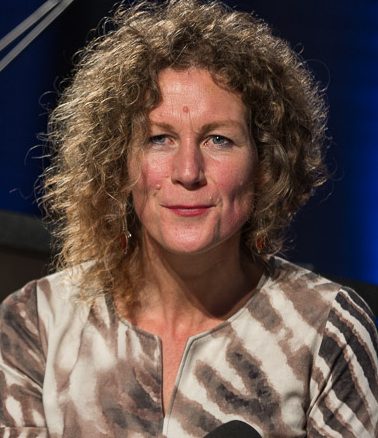“The success of populism depends on the construction of an alternative narrative that we can find in social media”, says novelist Juan Gabriel Vásquez.
By Carin Tiggeloven Stories matter. They tell us who we are, who we were and maybe even who we are going to be. We tell ourselves stories, the history of our families, regions, countries, friends and relatives. Like fairytales, these stories make us aware, not only of our common history but also of our shared values. These days stories are spread much easier and quicker than ever, by social media. And we can react immediately. But once the story is framed, it’s difficult to change it. And before we know it well, fake news is created. And for the Colombian novelist Juan Gabriel Vásquez here we are at risk: “The success of populisms and demagoguery depends on the construction of an alternative narrative capable of imposing itself on our common story; and that narrative, built on paranoia, conspiracy theories, distortions and outright lies, has found its dwelling place and its propagation mechanisms in social media.” And it worries him.

“I think there is a great responsibility in the hands of the citizens right now. See for example the election of Trump, the Brexit and in my home country the defeat of the Colombian peace agreement: people vote on lies, on post-truth, on deceit. For example, in Colombia they say the guerillas are paid more than normal people earn a month. Or in Germany, that Syrian refugees get more money than German workers.”
Learning to be critical
In Vásquez’s eyes, there is a special responsibility for citizens. And for the education of citizens: “It’s the role of universities to create citizens.” But not only universities should do so. “All schools should make children aware of the political world and the nastiest sides of politics.” Vásquez is a defender of an “ethics of information”. People should regain the truth again. There is a ‘civic responsibility’; we should learn again to be critical and do fact-checking. Each citizen should find out what to believe, and maybe look more at the traditional newssites, journals, papers. Education can be a guide in these. And: “We must take control of the story again. Of our own story as individuals: not the one being imposed on us by forces we cannot control. In other words, we must put what we may call the literary word back in the centre of our lives.”
Novels bear a truth
There is also the big European story of humanism: “secular and tolerant, liberal and open. It’s the Europe that lives in our stories (…) Societies are a framework of stories.” The writer’s plea is for stories, novels. Of course, he is a novelist. But it goes further than that. “By reading novels you discover another way of living in the world. You see life through the eyes of someone else. It changes your way of looking at the world. It leads to more understanding and tolerance concerning the other.” Through social media, there is a “loss of empathy and it leads to much more violence.” And novels bear a truth. He mentions his own continent. “The way history is written is something that worries me. In Latin America, the relationship with the past is fragile. Novels are the only way we can confront that uncertainty of history. In novels you can reach the invisible history. Novels are a building of little lies, that’s telling a big truth.” — Juan Gabriel Vásquez is a novelist from Colombia who lived in Europe for several years. In 2017, he was „Friedrich Dürrenmatt Guest Professor for World Literature“ at the University of Bern. Carin Tiggeloven works as a journalist and presenter in the Netherlands. She met Juan Gabriel Vásquez when attending the 2017 “A Soul for Europe”-Conference in Berlin. Photos: Jule Halsinger